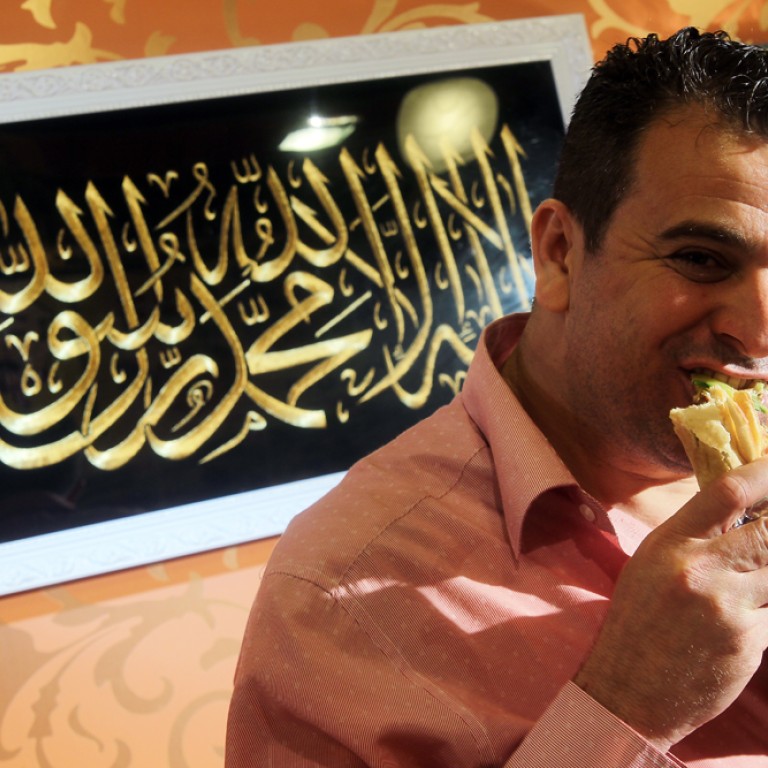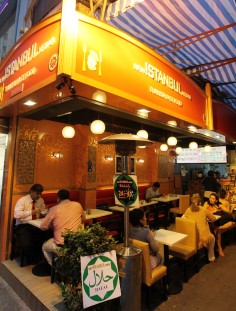
Roll up, roll up
Shawarma are hot right now, and while some vendors are sticking to traditional recipes, others are giving the Middle Eastern snack an Asian twist. Andrew Sun tucks in
IN TURKEY, IT’S CALLED a doner kebab. Other parts of the Middle East say shawarma. In Greece, it’s gyros. After a night of drinking, lads simply describe it as the perfect after-midnight snack.
Whatever you call it, taking shavings of spiced meat that has been grilled on a vertical spit, then wrapping them in flat bread and making it into a sandwich is popular the world over. It’s a daily staple in the Middle East, while it is considered fast food in Europe.
Hong Kong has been slower in developing an appetite for it, with the exception of the ubiquitous Ebeneezer’s chain exploiting its appeal to those with a beer buzz and empty stomach. However, there is one district where shawarmas are becoming relatively commonplace: Tsim Sha Tsui.

With traders and merchants from Arab and Muslim countries filling up depots and buildings such as Chungking Mansions, it’s only natural that small shawarma stands would pop up to offer halal food (prepared in accordance with Islamic law) to those homesick for their native cuisine.
The adventurous eater will find lots of interesting options for falafel, koftas, hummus and kebabs.
Firstly, a clarification of terms: shish kebabs are cubes of meat threaded on skewers, while doner or shawarma kebabs are fillets of meat pressed together, stacked and grilled.
Shreds are then cut from the vertical rotisserie. They can be chicken, lamb or beef.
The idea of cooking meats on skewers can be traced as far back as the time of Mongol ruler Genghis Khan in the 13th century. Others believe it was medieval Persian soldiers who came up with the idea of putting meats on their swords to cook over open fires.
The doner style is arguably Turkish in origin. In the 19th century, a man named Hacı Iskender is said to be the first person to turn the spit vertical during the Ottoman empire.
A lot of the Kowloon outlets reinforce this Turkish connection rather obviously. Within a kilometre radius around Tsim Sha Tsui and Jordan, I came across five outlets where the words “Turkish” or “Istanbul” are a part of the name.
On Woosung Street in Jordan, Turkish Doner Kebab House not only serves Middle Eastern fast food but a good selection of Pakistani and Indian curries. It is a common strategy for shops to diversify their menu, no different than the Chinese/Korean or Chinese/Thai/Vietnamese restaurants found in many European cities.
Turkish Kebab, a tiny shopfront on Chatham Road, supplements its offerings of shawarma sandwiches with pizzas – specifically, Anatolian style, such as the lahmacun, which is flat bread covered with minced lamb.
Regulars of bars off Chatham Road can get their post-drinking bite at three new kebab shops, all with similar names: Istanbul Kebab on Lock Road; Istanbul Express, an 80-seat dining space on Science Museum Road in Tsim Sha Tsui East; and, most recently, New Istanbul Kebab on Hart Road.
There is a reason three shops called “Istanbul” are in close proximity: Nelson Durmus is a partner in all of them. “For each of the shops, there are [different business] partners, so this is a way to keep them separate,” the Turkish entrepreneur explains.
Durmus, who has lived in Hong Kong for 15 years and is married to a local woman, seems most hands-on with the Hart Road venue, a modest space next to a building alley with seats but no walls. To put it nicely, the place has character. Most shawarma shops generally stay open late; New Istanbul Kebab is open 24 hours.
“This is a party area but many people find there’s no place to eat really late so we give service to them.
We do have a lot of Hong Kong people as regulars, as well as travellers from the Middle East and tourists. I notice local people like lamb. They don’t think it’s too [gamey] and they are used to it. We use no MSG or chemicals in the food,” he says.
The shawarma might have a bad rap as being unhealthy, but there is a simple way to make it more nutritious – you ask for more lettuce, tomato and onions. But the main health culprit is the dressing. In the Middle East, a yogurt or tahini-based sauce is common, but Hong Kong shops tend to cover the kebabs with a mayonnaise dressing, flavoured with either garlic, chilli or mint. Forgo this and you’ll get a meatier taste and fewer calories.
Two other new additions are Happy Camels on Ashley Road and Al-Maidah restaurant on Nathan Road.
Despite its name, there is no camel on the menu at Happy Camels – which is in an unpretentious setting at the mouth of the Ashley Road cul-de-sac – but they do have pasta and one of the better-made kebabs in the area.
The cleverest twist, though, is at Al-Maidah, situated in a commercial corridor between Lock and Nathan roads. In addition to a terrific chicken doner roll in pita bread, they serve the kebab meats over bowls of Asian instant noodles – a stroke of genius.
“We are the first to introduce kebab with noodles,” managing director Uzair Sipra says proudly. “More Chinese customers ask for it. We get a lot of guests from the northern [mainland] who are Muslim, so this is the best option for them. We started Al-Maidah about a year ago and I would say 70 per cent of our customers are Malaysians and Indonesians, then Arabians and mainland Chinese.”
Clearly, shawarmas are no longer just in the Turkish domain. Al-Maidah was opened by Pakistan native Sipra along with several partners. The restaurant’s name refers to a chapter in the Koran, meaning “big table of food”.
Sipra admits he only attends to his shop during the night shift, as his day job involves trading and media production. “Hong Kong is tough so we have this restaurant as a backup business,” he says.
“Over four million people come to Hong Kong every year and many are Muslims and need halal food,” he adds.
And late-night revellers will always appreciate a good shawarma.

